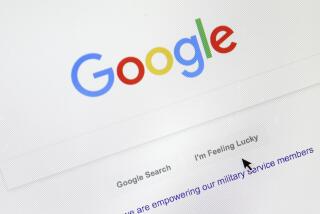MPAA report says Google, other search engines a major gateway to piracy
A study released by the Motion Picture Assn. of America is taking aim at Google, alleging the Internet giant and other search engines are making it too easy for consumers to find pirated content online -- even when they’re not looking for it.
A study released Wednesday by the MPAA, the trade group representing the major Hollywood studios, concludes that search is a major gateway to the initial discovery of pirated movies and TV shows.
The survey found that 74% of consumers surveyed cited using a search engine as a navigational tool the first time they arrived at a site with infringing content, even when the consumer was not looking for pirated movies or TV shows.
PHOTOS: Biggest tech flops of 2013 – so far
And the majority of searches (58%) that led to infringing content contained only general keywords -- such as the titles of recent films or TV shows, or phrases related to watching films or TV online -- and not specific keywords aimed at finding illegitimate content, according to the report.
“This study reaffirms the significant responsibility that search engines share with all of us in the Internet ecosystem to help prevent the theft of movies and TV shows online,” Chris Dodd, chairman of the MPAA, said at a press conference in Washington. “The television and movie community is working every day to develop new and innovative ways to watch content online, and as the Internet’s gatekeepers, search engines share a responsibility to play a constructive role in not directing audiences to illegitimate content.”
According to the MPAA’s research, 82% of queries that led to the pirated content came from the largest search engine, Google.
Google last year said it was modifying its search engine to penalize websites suspected of hosting pirated movies, music, video games and other copyrighted material. The move was an effort to mollify Hollywood, which has long been at odds with Google over the spread of online piracy.
ON LOCATION: Where the cameras roll
Google and other Internet giants in 2012 led a successful campaign to scuttle controversial legislation in Congress known as SOPA (Stop Online Piracy Act) and PIPA (Protect IP Act). The bills aimed to crack down on illegal websites engaged in piracy but were viewed by critics as an unwarranted intrusion on Internet freedoms.
In the latest report, the MPAA said it found no evidence that the change Google made to its algorithm last year to take into account the number of copyright takedown notices a site has received affected search-referred traffic to illegal sites.
Representatives of Google declined to comment.
A research paper published by the Computer & Communications Industry Association last month argued that search engines have been unfairly singled out in the effort to impede online copyright infringement, arguing the rogue cites like Pirate Bay receive very little traffic from search.
In a report released this month Google touted its anti-piracy efforts. “Google is a leader in rooting out and ejecting rogue sites from our advertising and payment services, and is raising standards across the industry,’’ the company said.
PHOTOS: Hollywood Backlot moments
“The content industry persists in its fixation on blaming the Internet and technology for its problems,” said Michael Beckerman, The Internet Association President and CEO. “In reality, the Internet is empowering content creators and consumers to access more lawful content than ever before. The fact remains that we have a law -- the DMCA -- to deal with removing infringing content, and it works very well. In fact, I would argue that the Internet provides a massive opportunity for creators to reach consumers and build their audience.”
The MPAA research echoes another study released this week that found the amount of bandwidth used for copyright infringement in North America, Europe and the Asia-Pacific region has grown nearly 160% from 2010 to 2012, accounting for 24% of total Internet bandwidth. That study produced NetNames, the British brand protection firm, and was commissioned by NCBUniversal, which is a member of the MPAA.
Dodd joined Reps. Howard Coble (R-N.C.), Adam Schiff (D-Burbank), Marsha Blackburn (R-Tenn.) and Judy Chu (D-Monterey Park) on Capitol Hill to release the results of the study.
“For years, I have been making the case that responsible players in the Internet ecosystem – from payment processors to advertisers to ISPs – have a responsibility and a self-interest to take voluntary, good-faith steps against rampant online piracy,” Schiff said. “This study shows that there is much more that search engines must do when it comes to pointing consumers towards legal outlets.”
ALSO:
Online piracy of entertainment keeps soaring
Piracy reduces foreign box office receipts by 7%, study says
Independent filmmakers feel the squeeze of piracy
More to Read
From the Oscars to the Emmys.
Get the Envelope newsletter for exclusive awards season coverage, behind-the-scenes stories from the Envelope podcast and columnist Glenn Whipp’s must-read analysis.
You may occasionally receive promotional content from the Los Angeles Times.







